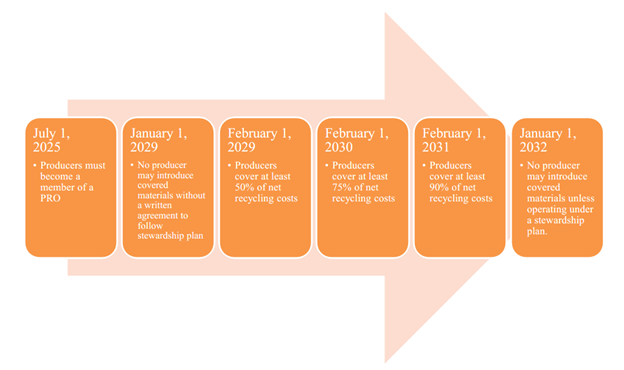Minnesota is now the fifth state—joining Maine, Oregon, Colorado, and California—to pass what are called “extended producer responsibility” laws, in line with a growing trend across the country [1]. In 2024, Minnesota enacted the Packaging Waste and Cost Reduction Act[2] (the “Act”). The stated goal of this legislation is to encourage sustainable design, while addressing the environmental effects of products brought to market.
For businesses that use packaging in their products (and let’s be honest, who doesn’t?), this new law introduces important changes designed to reduce packaging waste. Businesses will need to navigate these requirements in the near future. In particular, if you are a “producer” under the Act and produce certain packaging, you must be a member of an approved “producer responsibility organization” (“PRO”) starting on July 1, 2025.[3] By January 1, 2029, if you have not joined the PRO, you cannot introduce your packaged products in Minnesota.[4]
WHO MUST COMPLY WITH THE ACT?
The Act imposes new requirements on businesses that are deemed “producers” of packaging in Minnesota. While the Act generally holds the brand owner of a product responsible for compliance, its scope includes companies that introduce packaging into the state, including licensed distributors and resellers in some circumstances.[5] This means that not only manufacturers and brand owners, but also distributors, importers, and even retailers in many cases, will be required to take action under the new law.
Under the Act, the definition of “packaging” is also exceptionally broad, encompassing more than just a visible container around a product. Packaging includes any materials used to transport, protect, market, or handle a product. This means it covers not only traditional containers but also items like pallets, strapping, cushioning, weatherproofing, coatings, labels, and even inks and dyes. Essentially, if any material plays a role in moving or marketing a product, it may be considered packaging under the Act.
Put simply, most businesses will be affected by this law. For example:
- Electronics manufacturers;
- Toy companies;
- Grocery stores;
- Clothing companies;
- Importers that sell directly to consumers;
- Retailers of private-label products;
- Franchisors; and more.
That said, there are some organizations that are not affected:
- Government agencies;
- Nonprofit organizations that are registered 501(c)(3) charitable organizations;
- Small local businesses with less than $2,000,000 in global sales or introduced less than 1ton of packaging into Minnesota in the last fiscal year;
- Paper mills that exclusively use virgin wood fiber in the products they produce (e.g., a paper mill that manufactures paper using only newly harvested wood); and
- Paper mills producing containerboard from 100% postconsumer recycled content (e.g., a facility that makes corrugated cardboard entirely from recycled paper).
In addition, there are some materials exempted from the Act, such as packaging for infant formula, medical food, fortified oral nutritional supplements, drug or medical devices, medical equipment, newspapers, and magazines. The Act also exempts from “covered materials” those that are used to contain a product that is used for the production of another product (essentially B2B sales).
Businesses will need to carefully review the Act’s definitions and forthcoming regulatory guidance, and consider all factors specific to their operations to determine whether they are required to comply with the Act. Given the complexity of the law and its broad scope, it’s important to assess your business’s role and packaging practices to ensure compliance.
What Responsibilities Do Producers Have Under the Act?
The Act establishes a program that requires producers to become members of a PRO.[6] Producers will pay annual fees to the PRO based on the amount and types of packaging they sell.[7] The PRO will provide producers with guidance on compliance with the Act.
The Act states fees paid by producers will fund at least 90% of the costs (phased in over time) related to collecting, sorting, transporting, and preparing packaging and paper products for refill, reuse, recycling, or composting.[8] “Service providers” can receive reimbursements for offering such services, which will likely be paid for in substantial part by PRO membership fees.[9]
The PRO will also develop and implement a “stewardship plan,” approved by the Commissioner of the Minnesota Pollution Control Agency, which outlines how the PRO will expand collection services and cover service and program costs.[10] Through the PRO, producers must work together to meet the program’s requirements, including specific targets for waste reduction, reuse, recycling, composting, and incorporating recycled content in their products.
In particular, the Act establishes that PROs will work with their members to ensure packaging is reusable, refillable, recyclable, or compostable by no later than January 1, 2032.[11] Below is a list of the major milestones set out in the text of the Act:

Failure to comply with the Act carries significant liability, including civil penalties. [12] In cases of willful or negligent violations, producers may even face criminal liability.[13] Thus, businesses need to be aware of these consequences and take proactive steps to comply with the Act.
KEY TAKEAWAYS
To comply with Minnesota’s Packaging Waste and Cost Reduction Act, businesses must determine whether they are a “producer” of “packaging.” Producers must meet certain deadlines, including joining a PRO by July 1, 2025. The initial approved PRO is Circular Action Alliance (CAA) — a 501(c)(3) nonprofit, producer-led organization.[14]
For further advice and detailed guidance on adjusting your business practices in light of this new law, please contact your legal team. As always, the attorneys at Winthrop & Weinstine are dedicated to assisting your business in navigating these complex regulatory changes effectively. Please do not hesitate to contact us regarding any questions or concerns regarding the Act.
We express special thanks to Eddie Brody, who contributed to the research and content of this update.
[1] See Minn. Pollution Control Agency, Packaging waste and cost reduction act (2024) (listing Maine, Oregon, Colorado, and California as the four other states to pass EPR legislation).
[2] Minn. Stat. § 115A.144–1463.
[3] Minn. Stat. § 115A.1448, subd. 1(a).
[4] Minn. Stat. § 115A.1448, subd. 1(b).
[5] See Minn. Pollution Control Agency, Packaging waste and cost reduction act (2024) (noting that a “producer” within the meaning of the Act is generally the product brand owner); see also Minn. Stat. § 115A.1441, subd. 26(a)(iii) (“. . . if there is no person to which item (i) or (ii) applies, the producer is the brand owner of the item . . . .”).
[6] Minn. Stat. § 115A.1448.
[7] Minn. Stat. § 115A.1454, subd. 1.
[8] Minn. Stat. § 115A.1455, subd. 4(a).
[9] Minn. Stat. § 115A.1454, subd. 1(6)(ii).
[10] Minn. Stat. § 115A.1447(2).
[11] Minn. Stat. § 155A.1448, subd. 1(c).
[12] See Minn. Stat. § 115A.1462; Minn. Stat. § 115.071; Minn. Stat. § 116.072.
[13] Minn. Stat. § 115A.071, subd. 2(a).
[14] See Minnesota, Circular Action Alliance, https://circularactionalliance.org/circular-action-alliance-minnesota (last visited June 19, 2025).

